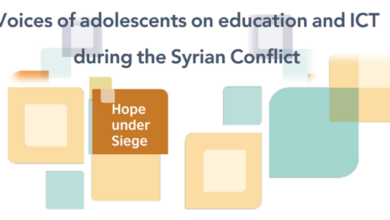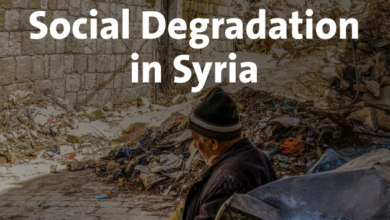Syrian Center for Policy Research:
This paper, “Religious, Ethnic and Gender Identity Politics in Syria” results from the second phase of a research project on the politicization of identity in the Syrian conflict, the first phase of which entailed a critical review of literature and theoretical approaches related to the politicization of identities, which resulted in the first background paper, “The Identity Politics in Syria,” published within the Know War project 2022. The Syrian Center for Policy Research is currently working on the third phase of the project, which includes the implementation of in-depth field research, according to a participatory methodology covering the entire Syrian geography, and the research will use quantitative and qualitative tools designed based on the previous two phases.
– The paper focuses on the concept of identity politics and its sectarian, ethnic, and gender manifestations. The purpose is to analyze the policies and practices that have exploited the diversity of identities in Syria in the service of the conflict. The analytical framework was developed based on the available literature reviewed by the Center’s researchers in the background paper and the contributions of participants in the Development Policy Forum (November 29th-30th, 2021) on issues of identity politics. The paper uses a framework based on the concept of development in its broad sense, and the framework of political economy; using a participatory approach.
-The paper identified many forms of divides based on religious or ethnic identities inside Syria such as: the growing influence of the clerics in communities in the political, social and military spheres; the spread of religious/sectarian inflammatory speeches; the spread of slogans and symbols with religious/ethnic connotations; employing the minority/majority discourse on most political and social issues; the associations of incidents of assassinations, kidnappings and mutilation based on religious/ethical motives; and the social media polarization based on religious/ethnic divides.
The politicization of gender identity has manifested itself in horrific forms of gender-based violence, including murder, rape, kidnapping, detention, and forced marriage. Societal stereotypes remained stubbornly persistent, in many cases subjecting women to exploitation, societal violence and sexual harassment. In the political arena, women’s representation was largely superficial, lacking any substantive empowerment in decision-making processes. Legal frameworks further marginalized women, particularly in matters of property rights, inheritance, guardianship, and nationality.
Also, the paper identified key actors and categorized their policies that fueled religious/ethnic based polarization as follows: Mobilization and Incitement; Grievances and Cultivation of Fear; Targeting the Other and Collective Punishments; Militarization and Financing; Gains/Spoils in Power and Resources; and Discriminatory Humanitarian Support. The report also highlighted civil society as a key actor in identity politics. Its main role has been to resist religious and ethnically based divides.
This paper is part of the Know War 2 project, which is implemented in cooperation between the University of Vienna, the Research Center for Alternative Development, and the Syrian Center for Policy Research, which is supported in part by a grant from Carnegie Corporation of New York.
Click here to read the full paper:
In English:
Religious, Ethnic and Gender Identity Politics in Syria.EN
In Arabic:
Religious, Ethnic and Gender Identity Politics in Syria.AR







